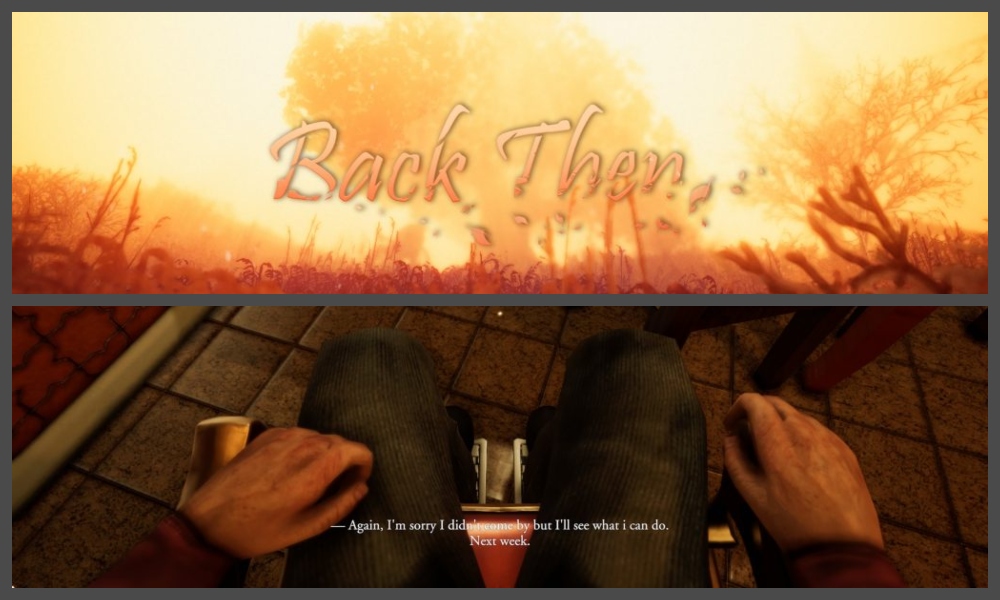A Moving Journey Through Alzheimer’s in Back Then: A Narrative Puzzle Game
Accompanied by the various ghosts of his life, Thomas Eilian journeys through his mind across four seasons, striving to reconcile with his family and himself while battling Alzheimer’s and the fragmentation of his soul in both past and present.

Back Then was one of those games that grabbed me the moment I saw the trailer—I knew I had to play it. Now that I’ve finished it, I find myself wondering what sparked that excitement. These days, I rarely get this worked up over flat-screen games anymore; I’m mostly into retro gaming or VR. Everything else tends to feel either like something I’ve seen before or just too overwhelming (time and size).
THIS IS BACK THEN…
Was it the melancholic music, the wheelchair scene, the art style, the storytelling approach, the studio behind it, or perhaps the focus on the topic of Alzheimer’s? Even after rewatching the trailer multiple times, I can’t quite pinpoint it. Honestly, I think it was a mix of “all of it and more.” The trailer explored themes I’d never seen in a game before, carried the feel of a VR experience, and had a captivating visual presence that practically demanded, “PLAY ME.”
Everything’s Gone…
Is it a dream?
Back Then is a puzzle and walking simulator game where the narrative takes centre stage. While it doesn’t explicitly hold your hand, it provides the player with relatively straightforward tasks throughout. Most of the game takes place within a two-story house, where you move back and forth to solve various puzzles. All the while, a near-constant narrative unfolds, often delivered by a family member sharing an emotional and deeply relatable story.
The game unfolds across four different seasons, revisiting the same locations, each reflecting distinct changes over time. Through Thomas’s eyes, you witness how the mind plays tricks on him—rooms shift, change appearance, or look entirely unfamiliar, creating a disorienting and immersive experience.
Is Back Then Scary?
Back Then isn’t a horror game, yet there were several moments when I braced myself for a jump scare—but it never came. This isn’t that kind of game at all. The reason it put me on edge was the way the story was told. My emotions were in overdrive: at times, I wanted to cry; at others, I wanted to smile. But for most of it, I felt like I was struggling to stay afloat. When the dark and moody atmosphere took over, the developer masterfully made it feel like it could veer into horror. That said, Alzheimer’s itself is terrifying for many, and this game captured that fear and conveyed it to me perfectly as a player.
The Verdict?
 Who is this game for? It’s for those who appreciate a compelling story, enjoy light puzzle-solving, and, perhaps most importantly, seek an experience free of action, violence, or text boxes. The game’s interactivity is minimal, consisting mainly of opening doors and interacting with a limited amount of items while immersing yourself in the narrative it delivers.
Who is this game for? It’s for those who appreciate a compelling story, enjoy light puzzle-solving, and, perhaps most importantly, seek an experience free of action, violence, or text boxes. The game’s interactivity is minimal, consisting mainly of opening doors and interacting with a limited amount of items while immersing yourself in the narrative it delivers.






Oj.. det vet jeg ikke om jeg våger å spille. Tror du skremte meg litt med heile artikkelen. 🫣🫣🫣
Som det står, det r jo ikkje skummelt, berre intenst. Er null jumpscares osv
Det var jo ikkje derfor eg blir skremt. Dette har me snakka om før! 😇😂😉